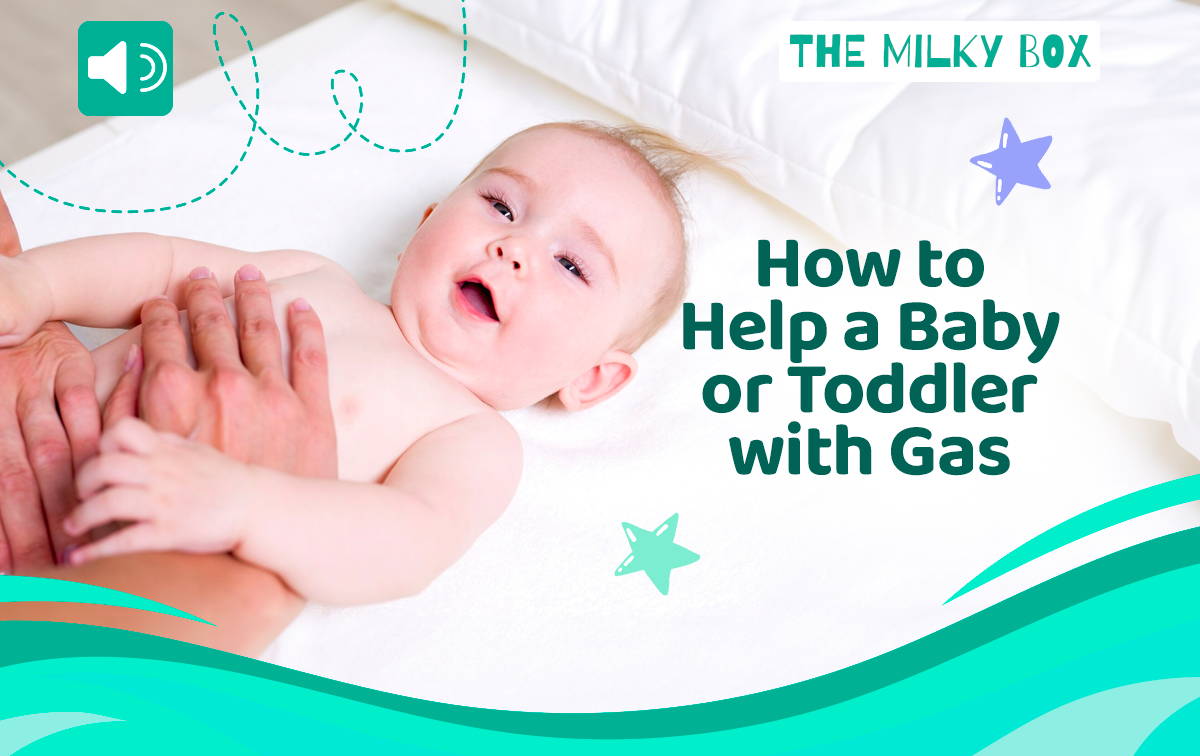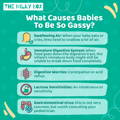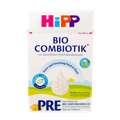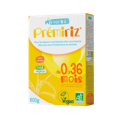If you suspect your fussy baby is genuinely uncomfortable, and they keep squirming and pulling up their legs, they might have some gas that refuses to pass. The best way to confirm your suspicions is to try some gas-relieving techniques, such as burping them and moving their body into different positions.
How to Help a Baby or Toddler with Gas
By: Suzanne Renee' - Updated December 13, 2023 - 11 Minute Read

Parents often get concerned when they notice their babies or toddlers experiencing pain due to gas building up in their intestines. However, suppose your little one is feeding well and is generally happy. In that case, there's no need to worry, as gas can be considered a regular occurrence and not necessarily a sign of other issues.
If your baby experiences gas, frequent fussiness, loose or foul-smelling stools, difficulty feeding or sleeping, or crying for an extended period, there may be underlying conditions.
In this article, we look at periodic gas troubles that cause your child discomfort and learn how to avoid common triggers and treat pain when it occurs.
What to Consider in Formula-Fed Babies
Gas in formula-fed babies can happen for several reasons. Probable causes range from sensitivity to milk-based formula to simple swallowing air when taking a baby bottle.
Type of Formula
When the gas in an infant becomes a concern, you may start by looking at a new formula at the first sign of discomfort. Though some formulas are designed with ingredients to help with gas, it is not always necessary to make the switch.
We recommend speaking to your baby's qualified practitioner before changing formulas. Your little one’s doctor may want to try other measures first to see if your baby's symptoms improve.
Feeding Technique
Excess air ingestion during bottle feeding is one of the most common causes of gas in newborns and can be easily prevented. If your baby doesn't have a secure latch with the nipple or the flow rate is unsuitable, the chances of swallowing air while feeding increase.
Here are some recommendations to help relieve gas during and after bottle feeding:
🍼Use an anti-colic nipple designed to guide air away from the nipple
🍼Choose the flow rate that is appropriate for your baby’s feeding skills
🍼Watch the latch on the nipple so air is not entering through the side of their mouth
🍼Hold your baby, so their head is higher than their tummy
🍼Burp your baby more than once while feeding
What to Consider in Breastfed Babies
Like parents who provide their babies formula, breastfeeding parents should only consider gas in their infant a problem if it is excessive or accompanied by other worrisome symptoms.
Parent's Diet
It is common for parents to hear that certain foods in the breastfeeding parents’ diet are the cause of gas. This information may be continually repeated in breastfeeding circles, but it is certainly not found in research.
Certain foods can cause some digestive worries in babies- especially in newborns. However, there is no list of foods that should be avoided.
The good news is most babies are fine with any safe food that mom eats during breastfeeding, so there is no reason to avoid any particular food to prevent gas unless you find an obvious reaction that causes an unusual amount of tummy distress in your little one.
Best Food for Breastfeeding Parents
Experts caution that breastfeeding mothers should not restrict their diet unnecessarily. Food avoidance can be a barrier to breastfeeding, causing some parents to discontinue breastfeeding early or not start at all from the (often unfounded) belief that they will have to cut out certain foods.
Eating a varied, nutritious diet is vital for breastfeeding mothers’ health and well-being. If your breast-fed infant has painful gas, talk to a pediatrician, dietitian, or lactation consultant before removing foods from your diet.
Latch and Position
Breastfed babies can experience painful gas if their feeding or holding positions are incorrect. If your baby has a poor latch, there are some obvious signs to look for.
🤱Babies who do not make sucking sounds as they nurse
🤱Breastfeeding for more than 30 minutes with no signs of fullness
🤱Bruised, cracked, and/or sore nipples
🤱Poor weight gain
🤱Pulling off the breast repeatedly
If you are concerned that your infant’s latch may cause gas in your little one’s digestive system, contact a lactation consultant or your pediatrician for advice.
What to Consider in Toddlers and Older Children
Just like infants, it is normal for kids and toddlers to have gas pain. Unless your child is experiencing more than minor discomfort and complaining a lot, it is generally not a cause for concern.
When gas is a cause of concern, you should not restrict your toddler’s diet unless you have talked with your healthcare professional first. At that time, you may try eliminating certain foods together to see if their symptoms improve.
Dietary Modifications
Keep a food diary to look at which foods may cause gassy tummies. Write down what your child eats or drinks.
Then record when your child gets gas. If you notice that the same food causes gas each time, avoid it and see if it goes away. Here are some foods that can cause gas and gas pains to help get you started.
🥛Artificial sweeteners
🥛Carbonated drinks
🥛Cow's milk (in cases of lactose intolerance)
🥛Eating too fast, so they don't swallow excess air while eating
🥛Fruit juices with a high sorbitol content
How to Treat Gas in Babies and Toddlers
There are various treatment options for babies and toddlers with digestive pain and discomfort. Home remedies and special nutrition are often remarkably effective at improving gas-related symptoms.
What to do for Gassy Babies
When your infant is fussy and displaying signs of abdominal discomfort, you can help ease this time.
Start with gently massaging the tummy. Lay your baby on their back and rub in a clockwise motion to help move the gas out. Another straightforward way to help make sure your little one finds relief is to gently grasp your baby's ankles and rotate their legs in a bicycling motion.
Placing a baby on their stomach while awake helps to relieve gas pains as well. Tummy time pushes gas bubbles up and out by gently increasing the abdominal pressure. Tummy time is also a wonderful way to strengthen the head and neck muscles needed to reach early motor milestones.
Toddlers and Older Children
Gas pains are typical for both toddlers and adults. Gas builds up in the intestines during the day, so they often pass more gas at nighttime.
During the day, monitor your child's diet and have them eat smaller meals, slowly, if possible. Incorporate plenty of physical activity during their day as well.
If your gassy toddler can't sleep at night, offer them small sips of water, and have them walk around a little to move gas through the digestive tract.
Why is My Baby So Gassy?
When formula-fed babies are uncomfortable, it can be hard to pinpoint the exact cause of their distress. Babies can have double the trouble with gas in their digestive system.
Their immature digestive system produces a lot of gas as it breaks down food, and babies also take in extra air from eating, crying, and even sucking on a bottle. In some rare cases, the baby's gas may be caused by a virus.
Swallowing Air
Extremely common and expected among newborns when feeding on bottle or breast or simply crying.
Immature Digestive System
When your baby’s digestive system empties too quickly, there can be uncomfortably copious amounts of slowly digested food. This can cause symptoms of gas and bloating.
Digestive Worries
Constipation in infants can contribute to abdominal pain and bloating. The longer your baby’s stool stays in your colon, the more time bacteria must ferment what's there, resulting in more gas and bloating. European baby formula is specifically tailored to help babies struggling with gas due to constipation.
Acid reflux or gastroesophageal reflux disease (GERD) can sometimes cause excessive gas and inflammation. Hypoallergenic formulas with organic thickeners can help to soothe gassy tummies caused by acid reflux.
Lactose Sensitivities
Babies with difficulty digesting lactose cannot fully absorb the sugar in milk (lactose). As a result, they have diarrhea, gas, and bloating after eating or drinking dairy products.
Gastrointestinal Virus
Tummy bugs in infants can cause symptoms like diarrhea, gas, and bloating. It usually goes away in about a week with proper treatment, but it can sometimes last much longer. Make sure you check with your pediatrician for the best course of action.

Best Formula for Gassy Baby
In search of the closest breastfeeding alternative or breastfeeding supplement that soothes the gassy digestion system of an infant, an increased number of parents are turning to the gentle nutrition of European baby formulas.
This uniquely designed nutrition is made to help relieve the gas, bloating, and discomfort that many babies struggle with. Options for gastrointestinal symptoms include baby formulas that have added probiotics, lactose-free options, hydrolyzed powders, and A2 milk-based alternatives.
Probiotics for Gassy Baby
If your little one is constantly gassy or struggling to pass gas daily, HiPP Combiotics may be the answer.
Carefully formulated to help ease your baby’s digestion with organic, clean ingredients and baby probiotics to help balance the gut with healthy bacteria.

✓Contains Probiotics & Prebiotics
✓ No sugar, no corn syrup, no soy
✓ No starch
✓ HiPP's gentlest formula
Hydrolyzed Formula for Gassy Baby
HiPP Comfort Baby Formula is designed for infants who cannot tolerate both cow’s milk and want to avoid soy milk-based formulas altogether.
This specialized nutrition contains proteins broken down by complete or partial hydrolysis. These protein fragments are much smaller than those in cow milk baby formulas, making them easier to digest and move through an infant’s system quicker, causing less gas, bloating, and pain.
✓ Contains Probiotics & Prebiotics
✓ Hydrolyzed milk protein
✓ Reduced lactose
✓ Easy-to-digest formula for gassy babies

Lactose-Free Formula for Gassy Baby
Premibio Organic Vegan Baby Formula is a plant-based baby formula that is a safe, healthy, and sustainable choice for infants, whether vegan, vegetarian, or omnivorous. This dairy-free formula is specifically formulated for the dietary management of infants with cow milk sensitivities that may cause digestive worries such as gas and bloating.

✓ 100% Organic Plant-Based
✓ Dairy Free
✓ Soy Free
✓ Lactose-free for gas-causing sensitivity
A2 Formula for Gassy Baby
Holle A2 Organic Baby Formula is designed with easy-to-digest cow’s milk that helps reduce colic and gas. The amount of lactose in A1 and A2 milk is the same. However, A2 milk causes less bloating than A1 milk.
✓ 100% Organic
✓ A2 Cow’s Milk Protein
✓ Essential fatty acids (DHA and ARA)
✓ Reduces natural inflammations caused by lactose

Gassy Baby
Parents and caregivers are often surprised by the amount of gas their little one can produce in the first year of life. Even with the best digestive circumstances, an infant can pass gas around 13-21 times daily.
It is good to know that if your little one’s nutrition contributes to painful digestive gas, The Milky Box has best organic baby formulas to soothe and treat symptoms. Pure, clean organic nutrition without harmful or toxic ingredients.
Frequently Asked Questions
How do I know if my baby is struggling with gas?
What age will discomfort from gas will pass?
Digestive worries related to burps and wind typically peak at six weeks and improve immensely by three months of age. At that point, even the fussiest babies tend to settle.
Do probiotics help?
Your baby's digestive system is home to trillions of live cultures. These beneficial bacteria create the microbiome in your baby’s tummy. However, if the “bad” bacteria outnumber the “good” bacteria, your baby will struggle with gas or bloating. You can support your healthy bacteria growth with baby probiotics. Studies show probiotics can reduce gas and bloating.
Disclaimer:
Please be aware that this information is based on general trends in babies, and it is not medical advice. Your doctor should be your first source of information and advice when considering any changes to your child’s formula and when choosing your child’s formula. Always consult your pediatrician before making any decisions about your child’s diet or if you notice any changes in your child.
Breastfeeding is the best nutrition for your baby because breast milk provides your child with all the essential nutrients they need for growth and development. Please consult your pediatrician if your child requires supplemental feeding.

Suzanne Renee' is an accomplished professional with extensive expertise in the area of infant nutrition, dedicated to promoting the health and wellbeing of children. She started this journey as a foster parent. Suzanne has emerged as a strong proponent of the European baby formula and has become a full time writer of the subject. In her free time, she enjoys camping, hiking and going to church.
Read Next:
Reviewed by Dr. Eric Wood, ND, MA

Dr. Wood is a licensed naturopathic doctor, with a doctorate degree from the Canadian College of Naturopathic Medicine in Toronto, Canada. He received his post-graduation certification in Mind Body Medicine at Harvard University.
With 15 years of experience, Dr. Wood is an Associate Professor of Holistic Nutrition at the American College of Health Sciences in Portland, Oregon. Dr. Wood is an educator, clinician, author, media figure, consultant, and owns his own holistic (naturopathic) medical practice in Ft. Lauderdale, Florida. Dr. Wood is currently researching and drafting books on cancer and pediatrics.
Outside of the medical profession, Dr. Wood loves singing with the Miami Lyric Opera and is an avid musician in South Florida. He also loves spending time with his wife and kids.

